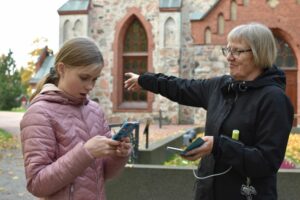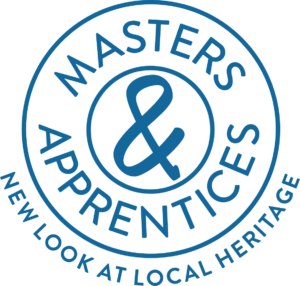Masters and Apprentices – a Template for Local Heritage Work
In the Masters and Apprentices project, children, adolescents and pensioners meet on equal terms, focusing on local cultural heritage. The groups share skills and knowledge, with generations learning peer-to-peer and engaging in useful, recreative communal activities. Everyone is involved in the planning of activities and creation of contents.
The project showcases local cultural heritage to new people and develops new ways of doing cultural heritage work. The aim is to establish the activity model as a mainstream method.
The activities are implemented by local heritage and neighbourhood associations and municipalities around Finland. The project is coordinated by the Finnish Local Heritage Federation, and it has received funding from the Finnish Cultural Foundation and the Ministry of Education and Culture. The first stage of the project started in 2018 and the second is underway.
The project has been met with enthusiasm and hundreds of children, adolescents and senior citizens have participated and learned more about their home region.

What to do?
Masters and Apprentices – template can be easily varied and it´s feasible anywhere in Europa.
Each group has planned its operating method individually. Here are some examples, what groups in Finland have done:
– Intergenerational correspondence. Pensioners and schoolchildren wrote letters to each other, telling about their lives. Group members realised that the joys and sorrows of children and adolescents have been similar over the decades.
– Book on the home region. Local stories were explored, recorded and illustrated in a book.
– Treasure hunt. The group encouraged participants of various ages to preserve history and cultural heritage through practical field work. The group used a metal detector and found a Viking Age burial ground.
– Traditional baking. Baking is very popular, and the groups get to know traditional dishes and how to follow a healthy diet.
– Handicrafts. Finnish children’s handicraft skills have declined markedly in recent years. The groups learn for example how to knit socks or make traditional Finnish lace.
– Excursions in the home region. Jointly planned trips to explore e.g., lake nature, water ecology and sites of local historical significance.
– Winter fishing. Many Finnish traditions well-known among the older generation are being lost. Fishing nets can be used even in winter under the ice. In the group, senior citizens teach the young how to fish in winter and prepare the fish. Climate change threatens the future of winter fishing, as winters are getting warmer in Finland and in many cases, the period of safe, sufficiently thick ice on lakes is shorter than before.
– Environmental painting. The neighbourhood is made more pleasant by painting concrete walls or illustrating switchboard cabinets with local stories, in cooperation with building owners and the local electricity company.
– eMuseum trail. The local stories and history of buildings is explored and compiled into a digital tour open for all on a web platform, a so-called eMuseum trail.
Many groups convene for a different joint activity each time, including baking, handicrafts, excursions, museum visits and teaching and learning digital skills.
Good feedback
The project has been met with enthusiasm and hundreds of children, adolescents and senior citizens have participated and learned more about their home region.
Comments by group participants:
“I’d love to live here.”
– A child about the Rovaniemi local museum building
“The association has found the school club to be an excellent activity for reaching schoolchildren and activating them for local heritage work. The children have been enthusiastic and the seniors as instructors have enjoyed the get-togethers as well.”
– Pensioner, Sotkamo
“In my opinion, senior citizens are very good partners in educating children and I hope that all children get the chance to interact with the elderly. Respectful interaction, diverse learning experiences and encouraging feedback strengthens the children’s self-identity.”
– Teacher, Rautalampi
“It has been rewarding to see how quickly the pen pals found common ground and how very intimate topics, such as fears, hopes and dreams, have been written about. The warm tone in the letters has been delightful.”
– Teacher, Helsinki
“Your letters are always important to me.”
– Student, Helsinki
“The students were very eager IT instructors. They were busy teaching their small groups of senior citizens how to use both pads and computers. A great experience!”
– Pensioner, Kerimäki
“I was surprised that they were so old!”
– A child, Helsinki
Why Masters and Apprentices?
Masters an Apprentices activities have many positive effects. All groups have succeeded in reducing bias about the interaction of senior and junior citizens. People of all ages found the intergenerational activity meaningful and beneficial for the quality of life.
Knowledge of one’s own cultural heritage and history strengthened in all groups, the young in particular. Juveniles were committed to local heritage work and realised its importance. Their local identity became stronger, and they found their roots.
The elderly learned about young people’s interests and ways of seeing the world and the digital equipment they use. The project’s goal, to enable people of different ages to learn from each other, was met.
Easy to repeat
We have succeeded in changing the conventional methods in a simple, innovative way. The template created is easy to repeat and helps secure the continuity of the activity and enables the commitment of young people.
When everyone is allowed to plan the activity and participate as a skilled actor, the activity is meaningful to commit to. The project guarantees everyone the opportunity to act as master. Enhanced interaction provides participants of all ages with important experiences with a long-term impact that strengthens personal identity and self-esteem.
The guidelines, training and examples provided for the groups have established many innovative aspects. Masters and Apprentices is a solution for transferring immaterial cultural heritage to the next generation and simple way to modernise associations’ activities. Above all, a sustainable way of life is redeemed.
See a video: Masters and Apprentices
See a video: Journeymen: Generations Sharing Heritage
Read more about eMuseums platforms (in Finnish):

